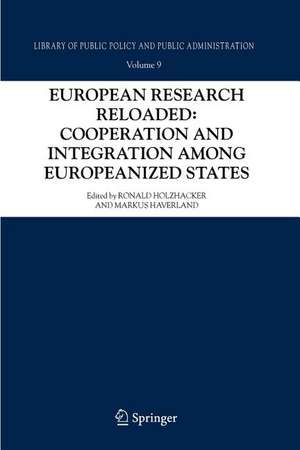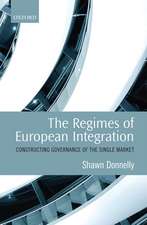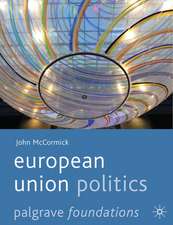European Research Reloaded: Cooperation and Integration among Europeanized States: Library of Public Policy and Public Administration, cartea 9
Editat de Ronald Holzhacker, Markus Haverlanden Limba Engleză Paperback – 10 oct 2011
| Toate formatele și edițiile | Preț | Express |
|---|---|---|
| Paperback (1) | 640.06 lei 6-8 săpt. | |
| SPRINGER NETHERLANDS – 10 oct 2011 | 640.06 lei 6-8 săpt. | |
| Hardback (1) | 646.30 lei 6-8 săpt. | |
| SPRINGER NETHERLANDS – 12 sep 2006 | 646.30 lei 6-8 săpt. |
Din seria Library of Public Policy and Public Administration
-
 Preț: 114.20 lei
Preț: 114.20 lei -
 Preț: 397.59 lei
Preț: 397.59 lei - 15%
 Preț: 640.88 lei
Preț: 640.88 lei - 18%
 Preț: 967.22 lei
Preț: 967.22 lei - 18%
 Preț: 895.58 lei
Preț: 895.58 lei -
 Preț: 384.31 lei
Preț: 384.31 lei -
 Preț: 391.61 lei
Preț: 391.61 lei - 15%
 Preț: 694.55 lei
Preț: 694.55 lei - 15%
 Preț: 698.15 lei
Preț: 698.15 lei - 18%
 Preț: 725.92 lei
Preț: 725.92 lei - 18%
 Preț: 951.47 lei
Preț: 951.47 lei - 15%
 Preț: 635.31 lei
Preț: 635.31 lei - 18%
 Preț: 949.10 lei
Preț: 949.10 lei - 15%
 Preț: 639.08 lei
Preț: 639.08 lei - 15%
 Preț: 642.51 lei
Preț: 642.51 lei - 15%
 Preț: 646.94 lei
Preț: 646.94 lei - 15%
 Preț: 646.43 lei
Preț: 646.43 lei
Preț: 640.06 lei
Preț vechi: 753.01 lei
-15% Nou
Puncte Express: 960
Preț estimativ în valută:
122.50€ • 132.24$ • 102.72£
122.50€ • 132.24$ • 102.72£
Carte tipărită la comandă
Livrare economică 18 aprilie-02 mai
Preluare comenzi: 021 569.72.76
Specificații
ISBN-13: 9789048171262
ISBN-10: 9048171261
Pagini: 288
Ilustrații: XIV, 270 p.
Dimensiuni: 160 x 240 x 15 mm
Greutate: 0.41 kg
Ediția:2006
Editura: SPRINGER NETHERLANDS
Colecția Springer
Seria Library of Public Policy and Public Administration
Locul publicării:Dordrecht, Netherlands
ISBN-10: 9048171261
Pagini: 288
Ilustrații: XIV, 270 p.
Dimensiuni: 160 x 240 x 15 mm
Greutate: 0.41 kg
Ediția:2006
Editura: SPRINGER NETHERLANDS
Colecția Springer
Seria Library of Public Policy and Public Administration
Locul publicării:Dordrecht, Netherlands
Public țintă
ResearchCuprins
Europeanization of the Member States - Beyond Goodness of Fit.- Introduction: Cooperation and Integration among Europeanized States.- Beyond the Goodness of Fit: A Preference-based Account of Europeanization.- Framing European Integration in Germany and Italy: Is the EU Used to Justify Pension Reforms?.- Explaining EU Impacts at the Domestic Level – The Europeanization of Regulatory Policy in Denmark.- Aggregating, Mobilizing and Recruiting: EU Integration and Party Functions.- European Integration - Integration and Cooperation among Europeanized States.- The Europeanization of Central Decision Makers' Preferences Concerning Europe: a Perpetual Motion?.- Domesticated Wolves? Length of Membership, State Size and Preferences at the European Convention.- Beyond the Community Method: Why the Open ethod of Coordination was Introduced to EU Policy-making.- Conceptual Challenges - Territory, Governance and Changing Notions of Sovereignty.- European Integration and Unfreezing Territoriality: The Case of the European Health Card.- Governing Mobility: The Externalization of European Migration Policy and the Boundaries of the European Union.- Sovereignty Reloaded? A constructivist Perspective on European Research.
Textul de pe ultima copertă
European integration has had an ever deepening impact on the member states. The first wave of research concerned the process of institution building and policy developments at the European Union (EU) level. The second wave, on Europeanization used the resulting integration as an explanatory factor in understanding domestic political change and continuity. What is now necessary is to link our understanding of these ‘bottom-up’ and ‘top-down’ processes of integration and Europeanization.
This book argues that a third wave of research on the EU is needed to adequately understand the increased interconnectedness between the European and national political levels. We posit that this third wave should be sensitive to the temporal dimension of European integration and Europeanization. In particular, we ask: how has Europeanization affected current modes of integration and cooperation in the EU?
One of the key findings of the book is the astonishing variation in modes of cooperation in the EU. We suggest that this variation can be explained by taking into account the sources of legitimacy on which cooperation and integration are based. We argue that whereas economic integration could be sufficiently backed by output legitimacy, deeper integration in other areas requires a degree of input legitimacy that is currently lacking in the EU. Therefore, non-economic integration is often taking forms of looser types of cooperation, such as the open method of coordination and benchmarking. We elaborate on this speculation in the conclusion and believe that it should be part of the future research agenda.
This book argues that a third wave of research on the EU is needed to adequately understand the increased interconnectedness between the European and national political levels. We posit that this third wave should be sensitive to the temporal dimension of European integration and Europeanization. In particular, we ask: how has Europeanization affected current modes of integration and cooperation in the EU?
One of the key findings of the book is the astonishing variation in modes of cooperation in the EU. We suggest that this variation can be explained by taking into account the sources of legitimacy on which cooperation and integration are based. We argue that whereas economic integration could be sufficiently backed by output legitimacy, deeper integration in other areas requires a degree of input legitimacy that is currently lacking in the EU. Therefore, non-economic integration is often taking forms of looser types of cooperation, such as the open method of coordination and benchmarking. We elaborate on this speculation in the conclusion and believe that it should be part of the future research agenda.
Caracteristici
Theoretically unites the process of European integration and Europeanization Provides up-to-date empirical research with methodological rigor Combines a comparative politics approach with international relations Posits the importance of democratic legitimacy in the further cooperation and integration of the EU and the member states
















